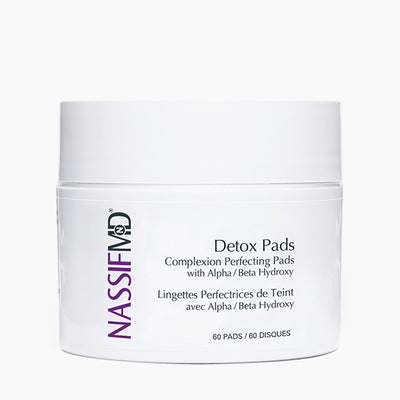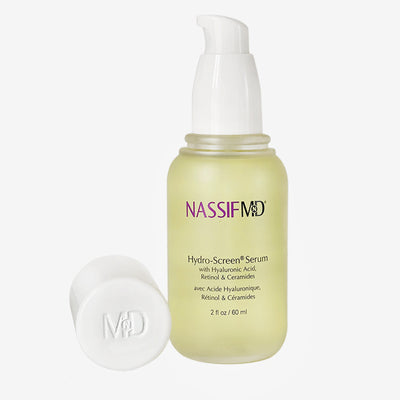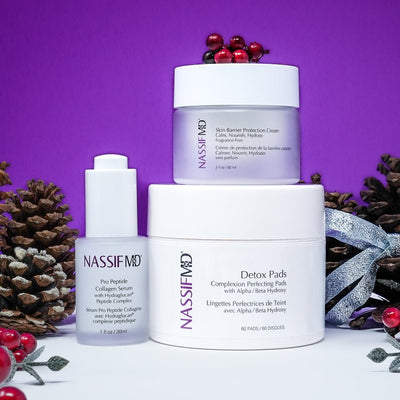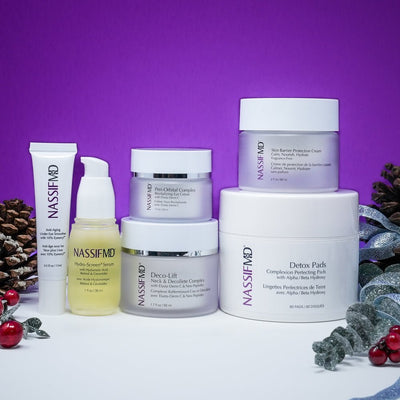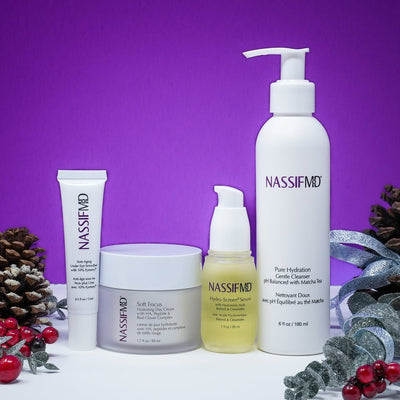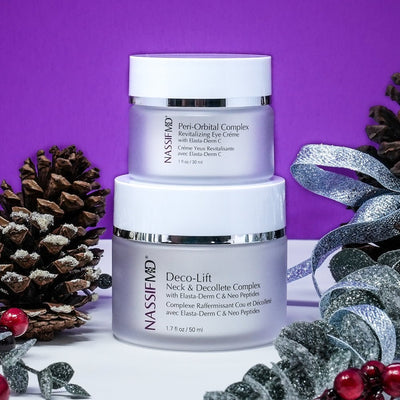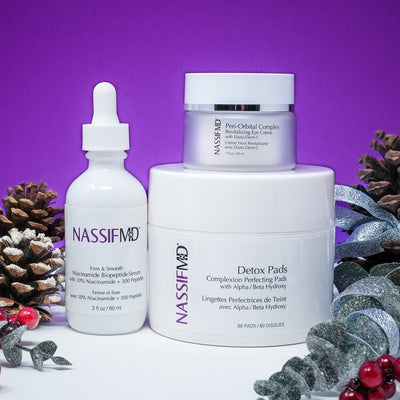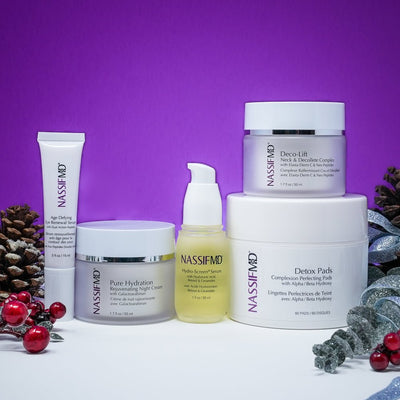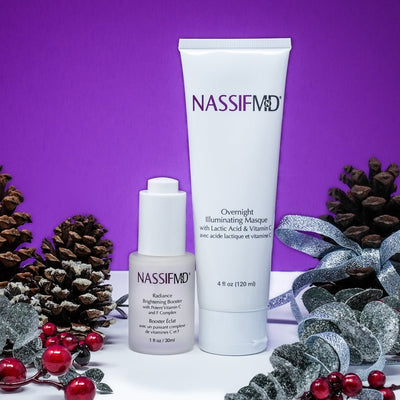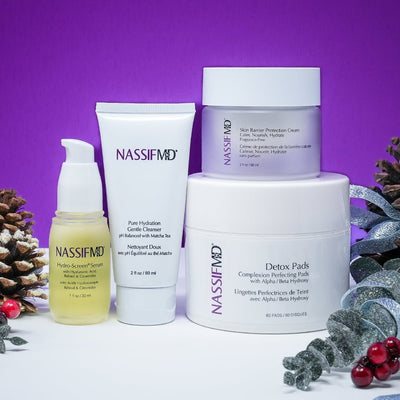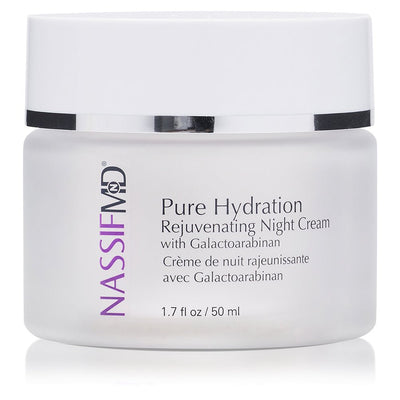Glowing Skin and Healthy Tresses – What Can Hair, Skin, and Nail Supplements Do For You?
Hair, skin, and nails problems may be due to underlying nutrient deficiencies. Replenishing essential nutrients with supplements supports hair growth, nail strength, and skin health.
Are you curious about hair, skin, and nails supplements and how they can help with:
- Hair loss
- Thinning hair
- Weak, brittle nails
- Fine lines and loss of skin elasticity
- Changes in skin tone and other signs of skin aging
Keep reading to have all your supplement questions answered, including:
- What vitamins are good for hair, skin, and nails?
- Do hair, skin, and nail vitamins work?
- Are hair, skin, and nail vitamins safe?
- How long before hair, skin, and nail vitamins work?
Plus, learn about NassifMD®’s new hair, skin, and nail gummies! Let’s get started!
What Vitamins and Supplements Are Good for Hair, Skin, and Nails?
Hair, skin, and nails require solid nutrition from protein, essential fats, vitamins, and minerals for strength and integrity. Besides eating nutritious food, supplements offer an easy and convenient way to ensure you’re meeting your daily nutrient needs. Plus, they can help target specific issues with your nails, hair, or skin.
Let’s look at some of the most important and common nutrients found in supplements that support hair, nail, and skin health, including:
- Biotin
- Omega-3 fats
- Zinc
- Vitamin C
- Collagen
Biotin
Biotin is an essential, water-soluble B vitamin necessary for energy metabolism and genetic expression. It’s naturally found in food including eggs, liver, salmon, pork, beef, sunflower seeds, sweet potato, and almonds.
Biotin is essential for amino acid balance; amino acids build the protein structures found in hair, nails, and skin. A biotin deficiency may appear on the skin; deficiency symptoms include rashes, hair loss, and brittle nails.
Hair, skin, and nail formulas, particularly hair formulas, frequently contain biotin in high doses, which helps increase hair strength. Biotin is non-toxic in very high doses; it’s water-soluble, and the body excretes any excess.
Omega-3s
The omega-3s include alpha-linolenic acid (ALA) found in flax seeds, walnuts, and chia seeds, and EPA and DHA from algae and fish. These fatty acids incorporate into the phospholipids that make up our cell membranes and play a role in cell signaling and the anti-inflammatory response.
A deficiency in omega-3 fats can result in rough, scaly skin, dermatitis, and a decline in the skin barrier. Not to mention, these fats are critical for brain, heart, and immune system health.
Consumption of omega-3 fatty acids in the diet and through supplementation have anti-aging benefits and reduce skin inflammation.
Zinc
Zinc is an essential mineral for protein synthesis and healthy cells found in seafood (especially oysters), red meat, pumpkin seeds, and lentils.
A zinc deficiency impairs growth and affects skin health, resulting in brittle hair, hair loss, and weak nails. Research suggests that supplemental zinc improves blood levels of zinc and nail strength.
Vitamin C
Vitamin C is an essential vitamin concentrated in the skin to provide antioxidant protection. Strawberries, citrus, bell peppers, broccoli, kiwi, and other produce contain vitamin C.
Using vitamin C supplements and topical serums is another way to increase vitamin C in the skin for benefits, including:
- Increased collagen production
- Antioxidant protection from sun damage and pollution
- Improved barrier function
- Decreased hyperpigmentation (age spots)
Vitamin C supports skin hydration, evens skin tone, and reduces signs of aging, such as fine lines.
Vitamin E
Vitamin E is another antioxidant found in the skin, which is lower in people with skin diseases, such as psoriasis and acne. Vitamin E is found in nuts, seeds, and other dietary sources, as well as multivitamins, supplements, and topical hair and skin treatments. Some evidence suggests that vitamin E increases hair count.
Collagen
Collagen is the most abundant protein in the body, concentrated in connective tissues, bone, skin, hair, and nails. (Keratin is another vital protein in hair, skin, and nails you may find in supplements).
Collagen production declines with age, leading to:
- Decreased skin elasticity
- Decreased skin thickness
- Increased wrinkles and fine lines
- Decreased skin hydration
- Thin or weak nails and hair
Luckily, collagen supplementation helps improve overall skin health and regeneration, elasticity, hydration, and reduces signs of aging. It also promotes hair growth.
Do Hair, Skin, and Nail Supplements Work?
Hair, skin, and nail supplements can certainly work, especially when the root cause of the concern is a nutrient deficiency that the supplement helps correct. All the nutrients listed above, especially collagen protein, have scientific support for their use in various skin concerns, including hair and nail issues.
Choosing high quality supplements from a reputable source is important to ensure the quality and purity of the supplements you purchase. Because dietary supplements aren’t very well regulated, there have been many cases of over-the-counter supplements failing to contain ingredients and dosages as listed on the label or being contaminated with toxins, such as heavy metals.
Are Hair, Skin, and Nail Vitamins Safe?
Generally, yes, quality supplements containing nutrients found in food are safe. However, there may be individual considerations based on a person’s medical history and medication use.
Always discuss new supplements with your doctor, especially if you take a medication or have a medical condition. Your provider can also do testing to identify deficiencies in nutrients such as biotin or omega-3 fats.
In addition, please note that high-dose biotin may interfere with thyroid, vitamin D, and other blood test results. Please discontinue use for a few days before blood testing or work with your doctor for guidance.
How Long Do Hair, Skin, and Nail Vitamins Take to Work?
Unlike some supplements, where you may notice immediate benefits, supplements targeting hair, skin, and nails may take some time to display their full effect.
Skin cells turnover anywhere from 40 to 56 days, depending on your age and other factors. It can take hair and nails several months to grow to the point where you can observe a change. Because of this, we recommend using hair, skin, and nail supplements for around two to three months to gauge the full benefit, although some will notice improvements much sooner.
Best Hair, Skin, and Nails Supplements
NassifMD® is proud to offer a new line of gummy supplements for hair, skin, and nail support.
NassifMD® Biotin Gummies contain 10,000 mg biotin per serving to target hair growth and regeneration. NassifMD® Collagen Gummies contain 96 mg of concentrated collagen to promote thick hair, strong nails, and firm, hydrated skin. Choose one or the other based on your needs, or take them together for maximum support.
With so much information, it can be hard to navigate which supplements are true to their claims, but NassifMD® has you covered with science-backed formulas made in the USA. Pair the internal nutrition support with topical nutrient-dense skincare designed to exfoliate, nourish, hydrate, and protect your skin.
References
- National Institutes of Health - Office of Dietary Supplements. Biotin Fact Sheet for Health Professionals. Accessed 4/10/23.
- Natarelli, N., Gahoonia, N., & Sivamani, R. K. (2023). Integrative and Mechanistic Approach to the Hair Growth Cycle and Hair Loss.Journal of clinical medicine, 12(3), 893.
- National Institutes of Health - Office of Dietary Supplements. Omega-3 Fatty Acids Fact Sheet for Health Professionals. Accessed 4/10/23.
- Xie, S. H., Li, H., Jiang, J. J., Quan, Y., & Zhang, H. Y. (2021). Multi-Omics Interpretation of Anti-Aging Mechanisms for ω-3 Fatty Acids.Genes, 12(11), 1691.
- National Institutes of Health - Office of Dietary Supplements. Zinc Fact Sheet for Health Professionals. Accessed 4/10/23.
- Wessells, K. R., Brown, K. H., Arnold, C. D., Barffour, M. A., Hinnouho, G. M., Killilea, D. W., Kounnavong, S., & Hess, S. Y. (2021). Plasma and Nail Zinc Concentrations, But Not Hair Zinc, Respond Positively to Two Different Forms of Preventive Zinc Supplementation in Young Laotian Children: a Randomized Controlled Trial.Biological trace element research, 199(2), 442–452.
- Pullar, J. M., Carr, A. C., & Vissers, M. C. M. (2017). The Roles of Vitamin C in Skin Health.Nutrients, 9(8), 866.
- Liu, X., Yang, G., Luo, M., Lan, Q., Shi, X., Deng, H., Wang, N., Xu, X., & Zhang, C. (2021). Serum vitamin E levels and chronic inflammatory skin diseases: A systematic review and meta-analysis.PloS one, 16(12), e0261259.
- Shenoy, M., Abdul, N. S., Qamar, Z., Bahri, B. M. A., Al Ghalayini, K. Z. K., & Kakti, A. (2022). Collagen Structure, Synthesis, and Its Applications: A Systematic Review.Cureus, 14(5), e24856.
- Maia Campos, P. M. B. G., Franco, R. S. B., Kakuda, L., Cadioli, G. F., Costa, G. M. D., & Bouvret, E. (2021). Oral Supplementation with Hydrolyzed Fish Cartilage Improves the Morphological and Structural Characteristics of the Skin: A Double-Blind, Placebo-Controlled Clinical Study.Molecules (Basel, Switzerland), 26(16), 4880.
- Hwang, S. B., Park, H. J., & Lee, B. H. (2022). Hair-Growth-Promoting Effects of the Fish Collagen Peptide in Human Dermal Papilla Cells and C57BL/6 Mice Modulating Wnt/β-Catenin and BMP Signaling Pathways.International journal of molecular sciences, 23(19), 11904.
- Geahchan, S., Baharlouei, P., & Rahman, A. (2022). Marine Collagen: A Promising Biomaterial for Wound Healing, Skin Anti-Aging, and Bone Regeneration.Marine drugs, 20(1), 61.
- Bolke, L., Schlippe, G., Gerß, J., & Voss, W. (2019). A Collagen Supplement Improves Skin Hydration, Elasticity, Roughness, and Density: Results of a Randomized, Placebo-Controlled, Blind Study.Nutrients, 11(10), 2494.
- Koster M. I. (2009). Making an epidermis.Annals of the New York Academy of Sciences, 1170, 7–10.


